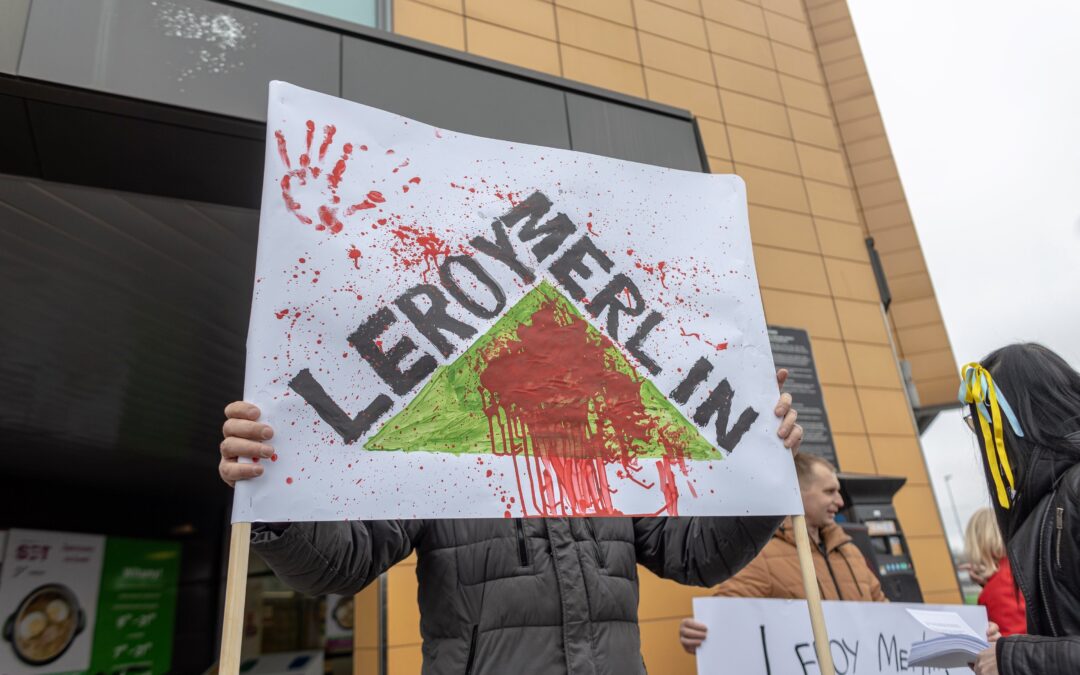By Anna Rzhevkina
Since Russia launched its war, Poland has been on the front line of providing support to Ukraine. It has received almost 2.5 million refugees – far more than any other country – and provided military and humanitarian aid as well as political backing to Ukraine.
It has also sought to apply economic pressure against Russia, both by pushing for tougher international sanctions and by pledging to end all Russian energy imports by the end of this year. Polish retailers and consumers have also joined these efforts, seeking to remove Russian (and Belarusian) products from their shelves and shopping baskets in a display of solidarity with Ukraine.
Meanwhile, firms who have continued doing business in Russia itself have been added to a so-called “list of shame”, resulting in protests and consumer boycotts in Poland.
Danish discount supermarket chain Netto – which operates almost 650 outlets in Poland – was among the first to adopt the ban, with its parent Salling Group announcing on 28 February that it was pulling all items of Russian origin – ranging from vodka to toothpaste – in Poland and its other markets.
It was soon followed by Biedronka, one of Poland’s largest budget retail chains, Żabka, the biggest convenience store network, and supermarkets including Carrefour, Lidl, Stokrotka and Kaufland. Some retailers said they would donate withdrawn products to charities helping Ukrainians.
“Products that are already in Stokrotka’s stores and warehouses, such as hygiene products for children and adults, will be donated to a charity related to support for Ukraine,” the company’s sales and marketing director, Mirosław Wawryszczuk, announced on 1 March.
“In connection with the war in Ukraine, Carrefour Polska decided to withdraw all products from Russia and Belarus from sale in its stores. The chain also does not intend to place new orders for Russian and Belarusian products,” the French supermarket chain wrote on Facebook.
A large “shop” offering free clothes for refugees from Ukraine has opened in a disused Kraków shopping mall, which has itself also been turned into a temporary shelter for hundreds of refugees https://t.co/bRr6DNyGm5
— Notes from Poland 🇵🇱 (@notesfrompoland) March 14, 2022
Responding to calls from consumers, drugstores and pharmacies have also withdrawn products linked to Russia and Belarus. Poland’s largest drugstore chain, Rossmann, recalled more than 150 products from its shelves, saying that it “does not want to support producers whose taxes, by feeding the Russian budget, can also be used for purposes related to the attack on Ukraine”.
Other similar chains, such as Super-Pharm and Hebe, followed. Among the Russian-linked brands removed by Hebe were Splat, Spasta, Ecolatier, Natura Siberica, Organic People, and Babuszka Agafia. The products include toothpaste, dental floss, brushes, and natural cosmetics.
Such decisions are, however, rather a symbolic gesture, given that Polish retailers stock very few Russian products. Russia’s share in Polish imports is about 6%, according to data from Poland’s statistics office, and most of that is accounted for by Russian energy resources.
Russian cosmetics account for just 0.1% of total import value and can easily be substituted by domestic products or imports from elsewhere, according to Polityka Insight, a political and business analysis agency.
“Russian and Belarusian items are not particularly numerous in the assortment of the Polish stores,” Maciej Ptaszyński, vice president of the Polish Chamber of Trade, told Notes from Poland.
Poland’s state consumer office and the Polish Food Market Chamber of Commerce and Trade have nevertheless asked Poles to pay attention to the barcodes of products they buy. Those on Russian products begin with numbers from 460 to 469, and Belarusian products have a barcode that starts with 481.
To give consumers clear information about products’ origins, a member of parliament, Michał Wypij, has proposed a law that would require Russian goods to be labelled with that country’s flag. “We want all products of Russian origin to be clearly marked so that Poles have a choice and can consciously join the boycott of Russian goods,” he said.
Even some goods that are not from Russia but have names associated with the country have been affected. Społem, a leading producer of mayonnaise and mustard, announced in March that one of its flagship products – the “Russian” version of its Kielecka mustards – would have its name changed to “Spicy”.
The decision was made “following the suggestions of consumers”, it said, while assuring that the Polish-made product would remain exactly the same as before apart from the new name.
Similarly, in the aftermath of the Russian invasion, a number of restaurants and shops around Poland changed the name of a popular variety of dumplings known as ruskie (a word that actually means Ruthenian but is widely used to refer to Russia). In some cases, they have been relabelled as ukraińskie, meaning Ukrainian.
Yet, while shoppers may initially pay attention to such things, they are less likely to do so over time, say Polityka Insight analysts Mateusz Fornowski and Hanna Cichy. “People often make purchasing decisions based on convenience, price, and attachment to the brand, especially in FMCG [fast moving consumer goods].”
“Withdrawing Russian and Belarusian goods has hardly had any impact on the market as a whole,” they add. “However, some consumers may be affected by the disappearance of their favourite brands and be forced to adjust their shopping habits.”
Pressure from consumers
Another element of the economic response to the war in Ukraine has been political, consumer and activist pressure against firms that continue to do business in Russia, whose names have been added to a so-called “list of shame”.
Recent days have seen protests outside Polish outlets of French retail chains Auchan, Decathlon and Leroy Merlin, with images of war victims and signs declaring that the firms have Ukrainian blood on their hands.
Polish citizens are not pleased with Auchan Decathlon Leroy Merlin over staying in Russia so they are blockading their 🇵🇱 stores pic.twitter.com/uDv162BnJv
— Exen 🇵🇱 (@Exen) March 28, 2022
LPP, a large Polish clothing company whose brands include Reserved, House and Cropp, also faced a wave of criticism after it declared at the start of March that it was withdrawing from Russia, but then continued operating in the country. Only this week did the firm confirm that it had finally completed the process of shutting down operations there.
This week, Decathlon also finally suspended trading in Russia, where it has 60 stores. The sporting goods company is a relatively small player in the country compared to Leroy Merlin and Auchan, which make 18% and 10% of their global sales in Russia respectively.
Poland’s prime minister, Mateusz Morawiecki, said that government data show declining sales at Polish stores run by companies that refused to exit Russia, though he did not specify their names.
Analysts at PKO, Poland’s biggest bank, noted last week that spending patterns from its payment cards showed that “chains which remained active in Russia have lower turnover dynamics than their competitors”.
Bojkot sieci handlowych, które nie wycofały się z Rosji, to więcej niż tylko hasła w mediach społecznościowych. Dane o płatnościach kartami @PKOBP pokazują, że sieci, które pozostały aktywne w Rosji, mają niższą dynamikę obrotów niż konkurencja. #StandWithUkraine pic.twitter.com/PuvjEX80OO
— PKO Research (@PKO_Research) March 23, 2022
These kinds of protests and boycotts against firms doing business in Russia, rather than consumers trying to avoid specific products, are likely to have a far greater effect on the market, say Polityka Insight’s analysts.
Marketing specialist Norbert Oruba agrees, telling Forsal that “Poles are now more willing than in the past to abandon products from companies with a value system different to their own”. Firms that find themselves on the “list of shame” could see a drop in revenue that could last for years, he says.
“In the pages of the history of Western brands that have not withdrawn from Russia, visible stains will remain.”
Main image credit: Michal Ryniak / Agencja Wyborcza.pl





















